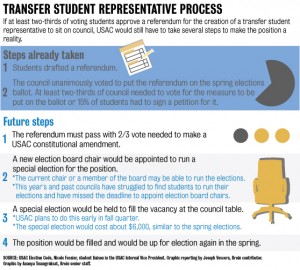Students will be able to vote next week on a referendum to create a transfer representative position on the undergraduate student government.
The referendum calls for an Undergraduate Students Association Council transfer representative, who would be a regular voting member of the currently 13-member USAC and would be tasked with representing the needs and interests of the transfer students. Currently, transfer students make up about a fourth of the undergraduate student body.
The referendum must obtain a two-thirds approval from the undergraduate student voting population to pass. If the position is created, the process and the cost of holding a special election to fill the position is currently unclear.
USAC councilmembers voted to place the referendum on the spring ballot at its April 15 meeting after numerous transfer students pushed for councilmembers to support the measure. They argued that they do not think that their needs are being represented by USAC because it is very hard for transfer students to run for office.
The transfer representative would receive a $672 stipend and run an office like other councilmembers, but would have to assemble staff members during the fall after taking office. The rest of the USAC councilmembers usually assemble their office staffs – including specific programming and budget directors who receive stipends – during the spring and summer.
The stipend paid to the transfer representative would have to come from existing funds and would likely reduce funding for other purposes, such as supporting student groups or programing events, said Roy Champawat, the director of the UCLA Student Union.
Because students will only vote on the approval of the position and not on candidates running for it during USAC elections, a special election would have to be held to fill the seat if the measure passes.
The exact timing of such an election is unclear because the process is not outlined in the USAC constitution or bylaws. According to the language of the USAC constitution, an open position that was recently created is not considered a vacant position. Because the specifics of how to fill a new position are not considered in the constitution, it is unclear if a possible special election would be governed by the constitution’s current rules on filling vacant council seat.
A lack of precedent may force USAC councilmembers to design a completely new procedure to fill the position.
At the April 15 USAC meeting, Election Board advisor Kris Kaupalolo said a special election could cost about $6,000, which is similar to the cost of the spring elections.
Kaupalolo later added that it is hard to predict the exact cost of a special election because preparations for it have not begun, and he is unaware of the cost of any past special elections held by USAC.

Champawat said the special election could cost about the same amount spring elections because the price of the voting infrastructure USAC uses stays constant regardless of the number of candidates or size of the election.
A special election would also involve significant time and monetary costs to administrators and candidates, though he thinks the costs would be less than they are for spring elections, Champawat said.
Connor King, a second-year psychobiology student, said he thinks the work and money required for a special election are too much, since the representative would only be in office for two quarters and might take a significant amount of time to assemble a working staff.
“If the referendum said the position would be filled next spring during normal elections, then it would be a different story, since cost wouldn’t be an issue,” King said.
Milo Yukimoto, a third-year biology student, said he thinks any money spent toward helping students is a good investment.
“UCLA is here for the students, so I think it’s good that we spend money on something that could benefit students,” Yukimoto said. “I feel like it’s important to represent all students, especially such a large group of students like transfers.”
In addition to the monetary costs of running a special election, USAC may have to appoint an Election Board to oversee the special election. The terms of the current Election Board members expire after the regular USAC elections.
According to its bylaws, USAC is supposed to select an Election Board chair before the first week of fall quarter each year. However, previous councils have missed this deadline by months. This year’s council appointed Anthony Padilla as Election Board chair in January, and the rest of the election board was not appointed until February.
Nicole Fossier, the student group liaison for the internal vice president’s office, helped draft the referendum and said she thinks students involved in the process should push USAC to appoint the Election Board chair on time to ensure the special election could take place as soon as possible.
“Council is supposed to appoint a chair before fall quarter, so we would just push them to follow the rules they agreed to,” Fossier said.
Fossier said she plans to work with the next council to amend the elections code to require that the new transfer position, if it is approved by voters, can only be filled by transfer students.
If students approve the referendum and create the position, Fossier said planning will begin soon after the elections next week.
Students will be able to vote on the referendum Tuesday through Friday May 9, and election results will be announced May 9 at 4 p.m. in front of Kerckhoff.